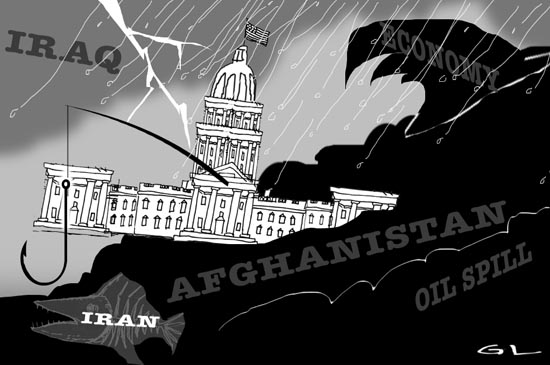Search
Recent comments
- wanton barbarism....
3 hours 38 min ago - little nazi....
5 hours 42 min ago - arm-wrestling....
6 hours 9 min ago - decision.....
6 hours 12 min ago - unhinged....
8 hours 51 min ago - nasty frog....
9 hours 1 min ago - words....
9 hours 9 min ago - The Seth Rich Question 15
9 hours 35 min ago - very serious....
9 hours 47 min ago - propaganda....
9 hours 52 min ago
Democracy Links
Member's Off-site Blogs
mission dysfunction...

Iraqis Are Less Certain Than Obama About End to the War
BAGHDAD — The morning after President Obama spoke of bringing the war in Iraq to “a responsible end,” insurgents planted their black flag on Tuesday at a checkpoint they overran by killing the five policemen who staffed it. It was the second time in a week.
The rest of the day, the police blotter looked like this: Three mortars crashed in Baghdad neighborhoods, where five roadside bombs were detonated and two cars were booby-trapped. Two other mortars fell in the Green Zone, still the citadel of power in a barricaded capital and still a target of insurgents who seem bent on proving they were never defeated.
By dusk, a car bomb tore through Kut, an eastern town long spared strife.
“Nothing unusual,” said Murtadha Mohammed, a 20-year-old baker, as he shoveled rolls into bags a short walk from one of the bombs. “We’ve been raised on this.”
The word “disconnect” never quite captures the gulf in perceptions between two countries whose fate remains reluctantly intertwined, however exhausted each seems of the other. Moments have come and gone: transitional governments, declarations of sovereignty, the signing of agreements. Mr. Obama’s announcement Monday was another.
On Tuesday, Qahtan Sweid greeted it with the cynicism that colors virtually any pronouncement the United States makes here, itself a somewhat intangible but pervasive legacy of seven years of invasion, occupation, war and, now, something harder to define.
“The Americans aren’t leaving,” Mr. Sweid insisted, whatever Mr. Obama had promised. “For one million years, they won’t leave. Even if the world was turned upside down, they still wouldn’t withdraw.”
From the first days after the fall of Baghdad on April 9, 2003, America and Iraq seemed divided by more than language; they never shared the same vocabulary. Perhaps they never could, defined as occupier and occupied, where promises of aid and assistance often had the inflection of condescension. These days, though, they do not even seem to try to listen to each other — too tired to hear the other, too chastised by experience to offer the benefit of doubt.
In a speech that was admittedly modest, Mr. Obama declared Monday that violence continued to be at the lowest it had been in years. Iraq is indeed a safer country than it was 2006 and 2007, when carnage threatened to shred the very fabric of its traumatized society. But security, still elusive here, is an absolute; you either feel safe or you do not.
The toll Tuesday — 26 dead in 8 attacks — was not spectacular for Iraq, where hundreds of people still die each month. But it came amid growing fears that insurgents are regrouping in Baghdad, Diyala, Falluja and elsewhere, eager to capitalize on the prospect of American troops leaving and the dysfunction of a political class that has yet to agree on an Iraqi government, nearly five months after the election.
http://www.nytimes.com/2010/08/04/world/middleeast/04iraq.html?_r=1&hp=&pagewanted=print
- By Gus Leonisky at 4 Aug 2010 - 6:45pm
- Gus Leonisky's blog
- Login or register to post comments
gruesome results of an illegal war...
Scores die in Baghdad bombings
Attacks in Baghdad have led to the deaths of at least 68 people with scores more injured.
In one strike at about 9:30pm (06:30 GMT) on Tuesday in a mostly Shia neighbourhood of the Iraqi capital, a bomb attached to a fuel truck exploded, killing eight people and wounding 44 more.
The tanker, which was filled with kerosene, was blown up in the northwestern Ur neighbourhood. There was no immediate claim of responsibility for the attack.
Earlier in the day, at least 60 people were killed in a suicide bomb attack at an army recruitment centre in the Iraqi capital.
Iraqi officials said at least 125 other people were wounded in that blast, when a suicide attacker detonated a bomb as men queued outside the centre in central Baghdad.
The attack occurred at the historical site of the country's defence ministry, a building that was turned into an army recruitment centre and military base after the 2003 US-led invasion.
Yasir Ali, who had been waiting outside the military headquarters said that he saw the bomber, describing him as a blond young man who walked up to an officer and blew himself up.
"Severed hands and legs were falling over me," the Associated Press news agency quoted Ali as saying.
-------------------